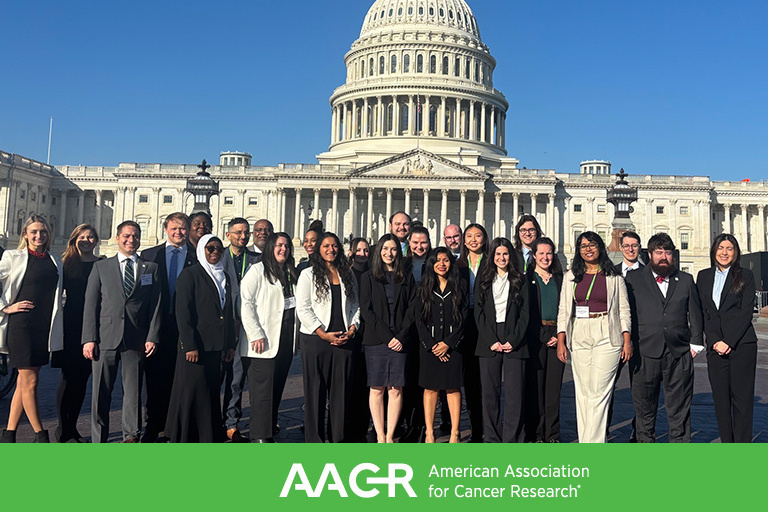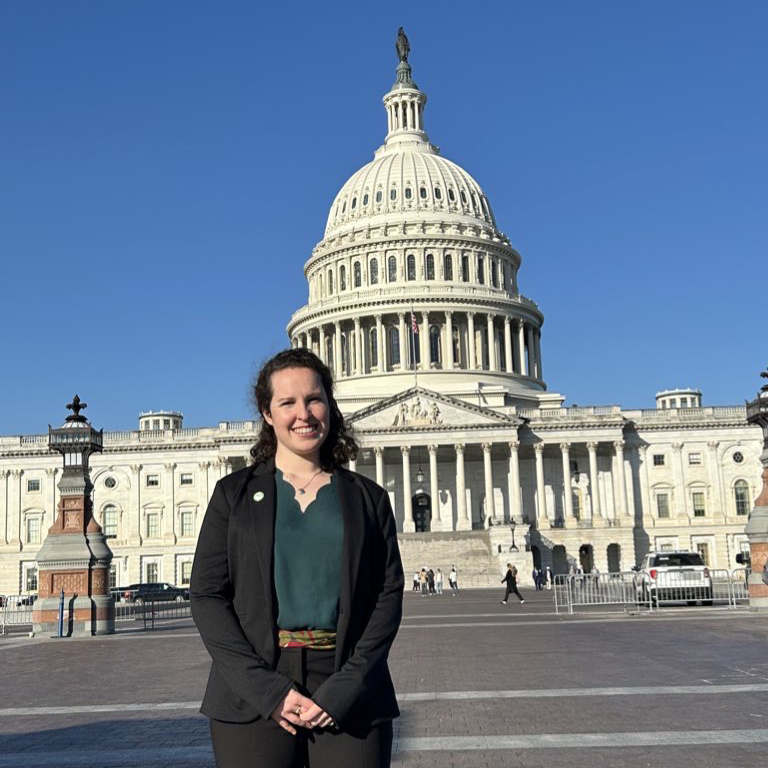
Koch Institute
May 29, 2025
MIT Koch Institute postdoc Meaghan McGeary traveled to Washington, DC to advocate for increased federal funding for cancer research as part of the annual American Association for Cancer Research (AACR) Hill Day. Joining other early-career scientists in a mission to make more than 50 congressional visits in a single day, she shared her experiences with policymakers, emphasizing the importance of stable research funding.
“It’s not a hard sell to anybody that cancer research is important. It’s not justifying the research—it’s justifying spending money on the research,” McGeary explains.
An advocate in training
In addition to training from the AACR, McGeary’s efforts drew upon her experiences as a researcher in the laboratory of Tyler Jacks, where she studies tumor evolution and drug resistance mechanisms in models of pancreatic cancer.
McGeary also cultivated her advocacy skills as a 2024-2025 Convergence Scholar. The Koch Institute’s Convergence Scholars Program, which is supported in part by the Kannan and Kendale Convergence Scholars Program Fund, helped her develop the skills to advocate effectively and communicate with policymakers during Hill Day. The program’s emphasis on science communication shaped how she presents her research to different audiences, from peers to policymakers. Networking opportunities facilitated by Tarek Fadel, program founder and the Koch Institute’s Director of Strategic Alliances, connected her with key people in her field, and discussions with peers in the program deepened her understanding of how the current climate affects research.
The program also reinforced the importance of knowing your audience and tailoring messages accordingly. "It was a different way of thinking about talking about these kinds of things, which was a helpful perspective," Meaghan said.

Meaghan McGeary stands in front of the U.S. Capitol Building.
A closer look at research funding
During her meetings with congressional representatives, McGeary emphasized key messages: the need to increase funding for the National Institutes of Health (NIH) and the National Cancer Institute (NCI), the detrimental impacts of recent funding cuts, and the critical importance of maintaining stable support for early-career researchers.
McGeary used the MIT Koch Institute as a case in point, explaining that its research depends on federal funding, including a Cancer Center Support Grant from the NCI which underlies its fundamental designation as one of seven NCI Basic Laboratory Cancer Centers and helps support the Robert A. Swanson (1969) Biotechnology Center (SBC). The core facilities at the SBC enable cutting-edge research, by giving Koch Institute and MIT researchers access to highly specialized equipment and technical expertise.
One example of critical research equipment she used was microscopes; policymakers and other non-scientists may be familiar with the kind of microscopes used in their high school or college biology classes, which are both easy to use and relatively inexpensive to buy. However, the type of microscopes at the SBC are often too expensive for a single lab to buy and maintain, and too complicated for researchers to learn how to use well on their own.
These advanced microscopes can open up exciting new possibilities for research, such as visualizing the cells that are expressing specific genes and using highly sensitive fluorescent imaging to observe at very high resolution the types of immune cells that are interacting with cancer cells in model tumors. Without reliable support, these facilities may reduce operations or shut down, limiting researchers' ability to conduct new experiments and also losing the momentum and knowledge that has been gained from experiments conducted over the years.
Maintaining the scientific pipeline
To further emphasize the impact of funding instability, McGeary highlighted the challenges facing scientific training programs. She shared how several NIH fellowships have significantly supported her career, enabling her to conduct important research and attend conferences and access other opportunities to advance her research and professional development as an independent researcher
Many programs have reduced or rescinded admissions, jeopardizing the careers of aspiring researchers. This disruption not only impacts present-day research, but also threatens the long-term pipeline of American scientists.
McGeary explained to policymakers that the trainees of today are the postdocs and faculty of the future, meaning reduced admissions could diminish scientific progress and cancer research advancements for years to come.
“These programs have been essential to my professional growth, and I want to see those opportunities exist for other young people in science as well," McGeary said.
Keeping up momentum
Most important to McGeary is ensuring that research and treatments that are currently in the pipeline are not lost to patients. McGeary told policymakers about her own grandfather, a melanoma patient who participated in one of the early immunotherapy trials over a decade ago.
The insights gained from patients like her grandfather have helped improve treatments, leading to significant advances in immunotherapy. These breakthroughs have extended lives and even raised hopes of a cure for some cancers.
Currently, researchers are working to expand the success of immunotherapies to more types of cancers, with many new or improved treatments in clinical trials.
“Disruption in lab experimentation and clinical trials means that a lot of funding and effort that has been poured into cancer research could be lost for now or even for good,” McGeary said.
“That includes the selfless contributions made by clinical trial participants like my grandfather. Although research requires a lot of continual investment to keep up the incredible forward momentum, patients can’t afford to lose the new cancer therapies we’re working towards for the future.”